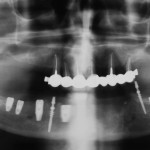
It has been reported that implantitis affects between 2-47% of implants and with the number of implants being placed rising years on year more patients are likely to be affected. The aim of this review was to assess the effectiveness of different interventions for the treatment of peri-implantitis.
Searches were conducted in Medline, PubMed, Embase and Dentistry and Oral Sciences Source. This was supplemented by handsearching of relevant journals. Study selection, quality assessment and data abstraction was carried out independently by two reviewers. Human clinical studies (Randomised controlled trials [RCTs], Quasi experimental designs [QE], cohort studies and case series [CS]) with a minimum sample size of 8 implants and a follow up time of 3 months for surgical and 6 months for regenerative procedures were included. Parameters evaluated included probing depth (PD) reduction, clinical attachment level (CAL) gain, bleeding on probing (BOP) reduction, radiographic bone fill (RBF) and mucosal recession. The weighted mean (WM) and the 95% confidence interval (CI) of the studied parameters were estimated using a random effects model.
- 21 studies were included, 5 RCTs, 3QEs, 1 cohort; 12 CS.
- 1 of the RCTs was considered to be at low risk of bias, 3 moderate and 1 high risk.
- 14 studies included smokers, 6 did not report smoking status and 1 was conducted in non-smokers.
- Meta-analysis suggested that grafting materials and barrier membranes resulted in greater PD reduction
[table id=46 /]
The authors concluded
Within the limitation of this systematic review, the application of grafting materials and barrier membranes resulted in greater PD reduction and RBF, but there is a lack of high quality, comparative studies to support this statement.
Comment
An update of a Cochrane review was published on treatments for peri-implantitis in 2012 (Esposito et al). That review was restricted to RCTs and included 9 studies and concluding that there was:-
No reliable evidence suggesting which could be the most effective interventions for treating peri-implantitis. This is not to say that currently used interventions are not effective.
This current review does note the Cochrane review in its discussion of other reviews in the area. It also notes that small number of studies that are available for each of the procedures included. The decision to include different study design in the same meta-analysis also needs to be highlighted. Weaker study designs like case series are more a risk of bias that more robust designs like RCTs and are prone to over estimate the size of the effect being measured.
Links
Chan HL, Lin GH, Suarez F, Maceachern M, Wang HL. Surgical Management of Peri-implantitis: A Systematic Review and Meta-analysis of Treatment Outcomes. J Periodontol. 2013 Nov 21. [Epub ahead of print] PubMed PMID: 24261909.
Esposito M, Grusovin MG, Worthington HV. Interventions for replacing missing teeth: treatment of peri-implantitis. Cochrane Database of Systematic Reviews 2012, Issue 1. Art. No.: CD004970. DOI: 10.1002/14651858.CD004970.pub5.
